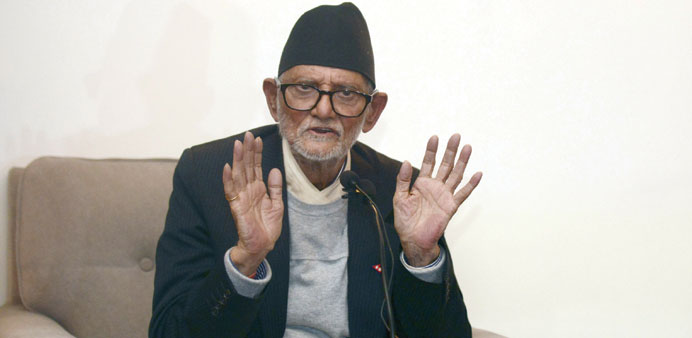Prime Minister Sushil Koirala resigned yesterday.
Nepal’s Prime Minister Sushil Koirala yesterday filed his nomination for re-election, a day before the parliament of the troubled Himalayan nation elects a new premier.
The leader of the Communist Party of Nepal (Unified Marxist-Leninist), KP Sharma Oli, has already thrown his hat in the ring for the prime minister’s post.
“So far, Koirala and Oli have filed their candidacy for the post of the prime minister,” Sudarshan Kuinkel, deputy spokesman for the parliament secretariat, said.
Kuinkel said Koirala’s candidature was unanimously backed by members of his Nepali Congress members, while Oli’s name was proposed by Maoist chairman Pushpa Kamal Dahal and supported by several other
parties.
As a formality, Koirala resigned from his post yesterday, which allowed him to register his name for the parliamentary election today.
If neither of the candidates is able to secure a simple majority, the speaker will set a date for a further election.
After the adoption of the constitution last month, President Ram Baran Yadav had asked the political parties to select a consensus candidate but the process to elect a majority prime minister began after the parties failed to reach an agreement by the deadline of Thursday.
Koirala had earlier pledged to step down from his post once the new constitution was adopted.
The new charter marked the final stage in a peace process that began when Maoist rebels laid down their arms in 2006 after a decade-long insurgency.
However, bitter disputes over its provisions have sparked violent protests and a blockade of a key trade route by demonstrators that has forced nationwide fuel rationing.
More than 40 people have been killed in clashes between police and protesters representing ethnic minorities, including the Madhesi and Tharu communities, who say a new federal structure laid out in the constitution will leave them under-represented in the national
parliament.
Local media reports said Koirala may have sensed an opportunity to continue running the country.
“Oli is not seen as a connector with the Madhesi community. Perhaps Koirala recognises that he is in a better position to reconcile,” said Akhilesh Upadhayay, editor of The Kathmandu Post.
Koirala is seen by many as a less divisive figure than Oli.
Meanwhile, Madhes-based political parties, whose strength is 57 in the constituent assembly and which have been protesting near the Nepal-India border for over a month, have decided to vote in Koirala’s favour.
Similarly, after the Maoist party’s decision to vote for Oli, 29 Maoist leaders issued a press statement opposing the party’s decision.
Koirala, who is single and is known to have a clean image in politics, became prime minister in February 2014 and successfully led the nation in bringing out a new constitution.
Oli, a lifelong Left leader, is known to be hawkish and an
ideologist.
There is growing sense in Kathmandu that due to the bonhomie between Oli and Dahal, if the former becomes the prime minister, this will pave the way for the Maoist leader to become the president of Nepal.

